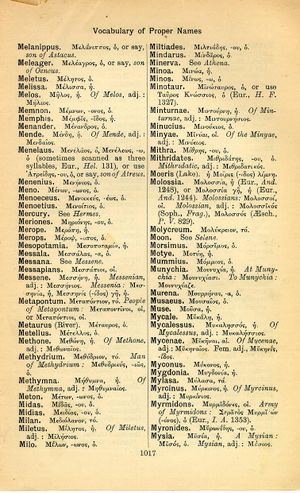Menoeceus
ἆρά γε λόγον ἔχει δυοῖν ἀρχαῖν, ὑλικῆς τε καὶ δραστικῆς → does it in fact have the function of two principles, the material and the active?
English > Greek (Woodhouse)
Μενοικεύς, -έως, ὁ.
Latin > English (Lewis & Short)
Mĕnoeceus: ĕi and ĕos, m., = Μενοικευς,
I son of the Theban king Creon, who sacrificed kimself for his country, Cic. Tusc. 1, 48, 116; Juv. 14, 240; Stat. Th. 10, 620; 651; 11, 709 al.; Hyg. Fab. 67.—Hence, Mĕnoecĕus, a um, adj., of or belonging to Menœceus, Menœcean, Stat. Th. 10, 756.
Latin > French (Gaffiot 2016)
Mĕnœceūs,¹⁶ ĕī ou ĕos, m. (Μενοικεύς), Ménécée [fils de Créon, roi de Thèbes] : Cic. Tusc. 1, 116 ; Stat. Th. 10, 620 || -cēus, a, um, de Ménécée : Stat. Th. 10, 756.
Latin > German (Georges)
Menoeceus, eī u. eos, Akk. ea, Vok. eu, m. (Μενοικεύς), Sohn des thebanischen Königs Kreon, der einem Orakelspruch zufolge sein Leben dem Vaterlande opferte, Cic. Tusc. 1, 116. Iuven. 14, 240. Stat. Theb. 10, 620 u. 651; 11, 709 a. – Dav. Menoecēus, a, um, menöcëisch, Stat. Theb. 10, 846.

